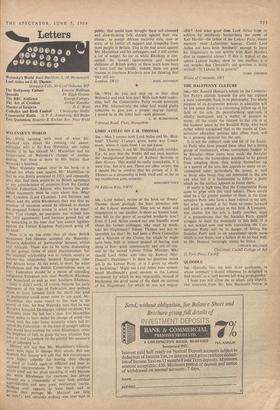Welensky's World Basil Davidson, L. M. Blotnenstok Lord Attlee on
J. H. Thomas Margaret Cole, Sir Cyril Osborne, MP The Halfpenny Culture Lincoln Hallinan Quoodle Sir Hugh Greene The BBC Audience George Campey The Act of Creation Arthur Koestler Murder at Sarajevo ' D. C. Watt Catholics and Birth Control Christopher Hollis Commercial Radio A. F. L. Armstrong, Bill Butler Two Quotations Maurice B. Reckitt, Rev. Peter Wyld WELENSKY'S WORLD Sirt,—While agreeing with most of what Mr. Macleod says about the cunning old career- politician who is Sir Roy Welensky, one rather doubts if he has cleared Mr. Macmillan and his Government of Welensky's charges of double- dealing. For there is more to this matter than Welensky's bombast.
What Welensky makes clear in his book—it is indeed his whole case against Mr. Macmillan—is that he was firmly promised in 1953, and repeatedly after that, that there would be no British agreement to any consideration of secession from the Central African Federation. Anyone who knows the pub- lished documents must be clear about this. What Mr. Lyttelton (Lord Chandos), Lord Swinton and others told the white Rhodesians then was that no question of secession would be allowed to darken the proposed Federal review in seven to ten years' time. True enough, no guarantee was written into the 1953 agreements; Lord Swinton passed this off by remarking at,the time that 'you cannot legislate against the United Kingdom Parliament going off its head.'
Now it is no less clear that all these British spokesmen had likewise accepted the Welensky- Malvern definition of 'partnership' between whites and Africans. There was to be some dismantling of the grosser forms of social discrimination; but the essential relationship was to remain, exactly as before—the relationship between European rider and African horse. At this point, in short, the white Rhodesians and the British Conservatives were at one; Federation should be a means of extending indigenous European rule over Northern Rhodesia and Nyasaland as well as over Southern Rhodesia.
Only it didn't work, of course, because (as early, opponents of this type of Federation may perhaps claim to have foreseen from the start) that kind of partnership could never come to any good. Mr. Macmillan also came round to this view in the course of time. Sir Roy Welensky says that he was therefore betrayed. Demagogic rubbish no doubt. Yet Welensky none the less has a case. 'For Macmillan never seems to have stated his change of mind—his break with the rider-horse mentality which had in- spired the Federation—in the kind of straight talking that would have enabled the white Rhodesians, never the brightest of folk, to grasp the new situation they were in, and to embark on the painful but necessary job of adjusting to it.
History will say that Mr. Macmillan's Govehi- meat were right to change their minds. But one suspects that history will add that this Government Were highly culpable for leaving their change of mind so widely opeh to different and even to opposed interpretations. For this was a situation which cried out for plain speaking, if only because the white Rhodesians (as everyone has always known) are a community of very little political sophistication and very great intellectual inertia. Nothing ever appears to have been said in Private (but perhaps Mr. Macleod can help us here?), and certainly nothing' was ever said in
public, that could have brought' these self-obsessed and slow-thinking folk sharply against their real choice: to accept African majority rule, now or soon, or to forfeit all support and sympathy from most people in Britain. This is the real count against Mr. Macmillan and his colleagues, and it still carries a lot of weight. So far as white Rhodesia is con- cerned, the inward equivocation and outward shiftiness of British policy in these years have been at least half the trouble. Indeed, there are good reasons in Southern Rhodesia now for thinking that they still are.
London, SWI3 BASIL DAVIDSON






































 Previous page
Previous page